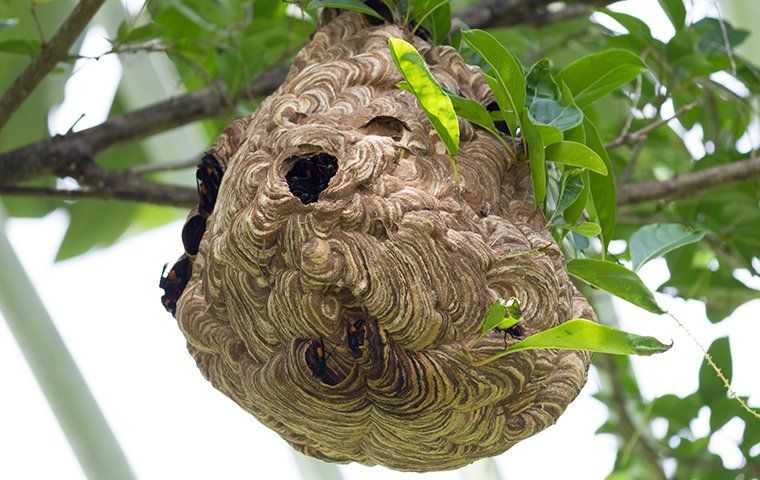
Stinging Insects In Virginia Beach Can Be Very Tricky To Get Rid Of
 Read Google Reviews
Read Google Reviews
Have you ever watched wasps buzzing around near your home or stared at a wasp nest on a high roofline and wondered what to do? Perhaps you just came back in the house from seeing one of these things. It is a common story in Virginia Beach. When wasps (or bees) start hanging around in increasing numbers, there isn't always an obvious nest (or hive).
So, how do you deal with a wasp nest when you don't know where it is? Worse, how do you deal with one you suspect is just inside a wall or ceiling void? Even seeing a nest out in the open doesn't make getting rid of stinging pests easier. They can create nests in tricky places, like a high roofline. On top of this, few Virginia Beach residents are trained in wasp removal or know the best way to get rid of a wasp nest.
Join us today as we consider the challenges of wasp nest removal and give you some insights and tips to help you understand wasp problems and do something about them. Remember that we're already here if you'd prefer a licensed technician to tackle your wasp issues. Hawk Mosquito & Pest provides science-based solutions for wasp control in Virginia Beach. We're here if you need us.
Common Types Of Stinging Insects Found In Virginia Beach
There are many common stinging insects in our area. They fall into the following categories—bees, wasps, and hornets. But wasps and hornets actually fall into the same category. While not all wasps are hornets, all hornets are wasps, and hornets don't have any unique behavior patterns that differentiate them from other wasps, apart from size and species. Therefore, we'll separate stinging insects into just two categories—bees and wasps.
Bees:
- Honey bees are social insects that create hives inside structural voids and have drones that gather into swarms to protect their nests. These are tiny, furry-looking insects.
- Carpenter bees are solitary insects that do not swarm and are far more dangerous to structural wood than humans. These are large, furry-looking insects, but only the front half. The back half of a carpenter bee (the abdomen) is shiny and black with no prominent hairs.
- Bumble bees are similar to honey bees, only they live in smaller colonies and create their nests under hay bales and in other organic habitats. These big, furry-looking bees have hairs on their abdomens.
Wasps:
- Paper wasps are social insects that swarm. They typically create aerial nests made of paper-like material out in the open, where you can see them. But they can also build a nest inside a structural void. If you see large, reddish-brown wasps with yellow legs, those are paper wasps.
- Yellow jackets are tiny, social insects that swarm. They typically create their nests in ground holes or structural voids. If you see small black and yellow wasps in your landscaping, they are likely yellow jackets.
- Bald-faced hornets are large, social wasps that swarm. They create aerial nests in the open, just like paper wasps. They're known for having sentry drones. These wasps fly around outside the nest, so keep an eye out for danger. If you see large white and black wasps, you have a bald-faced hornet problem.
These are the stinging insects you can expect to find on your Virginia Beach property, and a few important facts about each. Let's quickly look at what it means to have these pests on your property, near your home, or living inside a structural void.
Stinging Insects Around The Yard Can Be Very Problematic
As you consider what steps to take regarding your stinging insect issue, you should know a few things about bee and wasp behavior. The more you know about stinging insects, the greater your chance of avoiding unwanted encounters.
- Wasps are attracted to the scent of garbage and eat protein sources found in trash receptacles. If you have a container near an exterior door, a wasp can fly in as you open the door. They may also create a nest on a roofline above a trash receptacle.
- Stinging insects are attracted to moisture problems, such as a clogged gutter or landscaping that is overgrown. If you have damp conditions near your home or wood debris, you'll invite more wasp activity.
- Yellow jackets that create a nest in the ground can get agitated by the vibration of a lawn mower. If you hear buzzing coming from the ground or in a hole, take caution when mowing near the area.
- Stinging insects respond aggressively to rapid movement. If approached by a bee or wasp, walk briskly away without swinging your arms to avoid a sting.
- Stinging insects are attracted to sweet liquids. Check juice cups carefully when enjoying a beverage outdoors. You may place your hand right on a stinging pest.
The primary issue with stinging insects is that they sting. If you get stung, knowing what to do for a wasp sting or a bee sting is helpful. The procedure is similar for both:
- If stung by a honey bee or bumble bee, use tweezers to remove the barbed stinger. Wasps don't leave a stinger because their stingers do not have a barb and do not get caught in the skin.
- Clean the wound with soapy water and disinfect.
- Use a cold compress to reduce the swelling and discomfort.
- Use a hydrocortisone cream to reduce the itching and further reduce swelling.
- Refrain from scratching the wound.
- Seek medical assistance if you experience flu-like symptoms.
These tips will help you make bees and wasps less problematic. Now, let's look at some ways you can alter conditions on your property to reduce stinging insect activity, nest creation, and unwanted entry into your home.
Tips And Tricks To Prevent Stinging Insects In Your Yard
Bees and wasps choose yards that provide what they need. Both will look for sources of nectar. Therefore, flowering weeds will attract them. Both will look for properties with water to drink, like puddles or moisture problems. Wasps are uniquely attracted to protein sources and tend to select yards with lots of bugs or exposed trash. Finally, wasps create nests with pulp, so wood debris will make it easier for them to make their nests. Bees produce wax from honey and do not require pulp sources. With these facts in mind, here are some prevention tips:
- Address weeds in your lawn and landscaping to reduce sources of nectar.
- Remove things from your yard that smell like flowers or are brightly colored, like a flower.
- Keep trash in covered receptacles and avoid overfilling your receptacles, which can prop the lid open.
- Keep lights off at night to reduce the overall insect populations in your yard.
- Remove logs and stumps.
- Keep construction materials protected.
- Store dead branches in a covered bin.
Along with reducing bee and wasp activity, you'll also want to take steps to keep them from finding a cavity in which to build a nest. This step is critical for both bee and wasp prevention but falls somewhat short for paper wasps and bald-faced hornets due to their ability to make aerial nests out in plain sight. Take the following preventative measures:
- Inspect the siding on your porch, fill small gaps with expanding foam, or apply a caulking material.
- Inspect your exterior doors and ensure that you have no gaps.
- Inspect the screens on all of your doors and windows. Repair any damage.
- Inspect your utilities and fill in gaps with expanding foam.
- Inspect the frames on your doors and windows, and use a caulking gun to fill in cracks.
These steps will help you get in front of bee and wasp problems. What do you do if you already have a wasp nest? As we pointed out, dealing with stinging insects is a tricky task. Here is our suggestion.
Call Us For Effective Stinging Insect Control
It pays to contact Hawk Mosquito & Pest if you start seeing a stinging insect problem on your property. We offer a range of options for dealing with bees and wasps. If you need professional wasp nest removal, our technicians have the safety gear and technologies to remove your nest, even if it is in a tricky place.
If you want ongoing bee and wasp prevention, we can help with that, too. Our home pest control service plan provides many layers of protection:
- Your service visits come with routine inspections. When we see wasp activity, we deal with it.
- During service visits, we apply spot treatments to reduce insects, which wasps eat.
- During service visits, we apply a liquid treatment around your exterior to help keep pests out of your home. The barrier also works to prevent bees and wasps from creating nests in structural voids.
Do you have questions about wasp control in Virginia Beach that we didn't answer here? We're happy to answer them. Hawk Mosquito & Pest is your source for industry-leading pest control in Virginia Beach and the surrounding area. Connect with us today.

Latest Blogs
Stay informed about pests and pest-related issues in your area!
Customer Reviews
-
"Use this company!! They are awesome."
The staff are top shelf and very customer service oriented. The quality of their work is great and we have loved using their services. There are certainly a lot of choices when it comes to pest control, but you won’t be disappointed with Hawk.
- Jarrod S. -
"Communication is unbeatable."
Great service!!! I ALWAYS get a text prior to them coming. Gives me time to put dogs away. I am able to address any issues with them at that time.
- Jamie C. -
"Hawk is a great company with an amazing staff."
They are always professional, courteous, and friendly. Everyone from the receptionist to the technicians surpass all levels of professionalism and make you feel like your business matters.
- Heather W. -
"Great company with a customer first mindset."
Great pricing, timely service response, effective solutions with an effortless customer experience. I highly recommend Rob and his Hawk Mosquito & Pest Team for all of your pest control needs - preventative and reactive.
- Chris L. -
"Thorough, educated, and gave us great advice."
Robert arrived to our inspection even before we did! He was thorough, educated, and gave us great advice. I will happily hire Hawk again and recommend the company to all of my friends and family.
- Elizabeth L. -
"Great service, follow through is 100% on everything."
We’ve used them to encapsulate and routine pest control for our home. Tommy is the best.
- Michell S. -
"Hawk communication is great!"
I always receive confirmation text for when service is scheduled. We have not had any mosquito issues and have had a great time in our backyard on the lake. Thank you Hawk!!
- Beverly S. -
"Always does an amazing job!!!"
We are so happy we changed over to Hawk a couple of years ago! We don’t have to keep track of the schedule and call a different company for different pests. Thank you so much, Hawk for your loyalty and quality service!
- Rochelle R.


.2402210201550.jpg)
